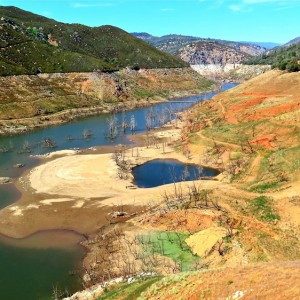Federal Water Tap, August 31: Tennessee Valley Coal Ash Ponds Begin Journey to Closure
The Rundown
EPA completes a quick internal review of Colorado mine spill. Pesticides in U.S. rivers generally rise and fall with farm use. Tennessee Valley Authority plans to close coal ash ponds. Regulators prepare a new national pipeline map. California desalination plant begins environmental review.
“If another country threatened to wipe out an American town, we’d do everything in our power to protect ourselves. Climate change poses the same threat, right now.” — President Barack Obama, speaking in his weekly radio address about how coastal communities in Alaska will have to be relocated because of rising seas. Today, the president begins a three-day tour of the country’s biggest state.
By the Numbers
11: Number of coal ash ponds that the Tennessee Valley Authority seeks to close by 2018. (Tennessee Valley Authority)
10 parts per billion: Arsenic concentration at which female mice, exposed while in the womb, became prone to early puberty and obesity as adults. That concentration is the federal standard for arsenic in drinking water. (National Institutes of Health)
Reports and Studies
EPA Review of Mining Spill
The team working at the Gold King mine did not measure the water pressure behind the blockage at the Gold King mine, according to an internal U.S. Environmental Protection Agency review. Pressure readings were taken during cleanup operations at nearby Red and Bonita mines, but the same measurements were not taken at Gold King because of the technical difficulty and expense. Underestimating the pressure was the primary cause of the blowout, the report concludes. Moreover, the team did not attempt to calculate the amount of water stored behind the blockage, so it did not have an adequate emergency plan.
Pesticides in U.S. Rivers
The concentration of pesticides in U.S. rivers largely follows patterns of agricultural use — more pesticides applied, more found in water bodies, according to a U.S. Geological Survey study.
For those cases that did not follow this pattern, concentrations were usually higher than use would indicate. There are several possible explanations, according to the paper: there might be a long lag time between when a pesticide is applied to the field and when it enters a river; there might be some urban uses that were not accounted for; or there might be changes in farm practices, such as installing tiles below the field to drain water from the root zone, that would increase the movement of pesticides to rivers.
Researchers assessed 11 pesticide compounds for 38 major rivers. Several significant pesticides — glyphosate, the main ingredient in Roundup, and neonicotinoids, which are harmful to bees — were not studied, because of inadequate data for identifying long-term trends.
News Briefs
Pipeline Mapping
The federal pipeline regulator is updating the National Pipeline Mapping System for the first time since 1998. The Pipeline and Hazardous Materials Safety Administration released a list of data that it will not require pipeline operators to submit:
- The installation method for pipelines crossing water bodies more than 100 feet across
- Type of leak detection
- Average daily flow
Pipeline safety advocates supported the inclusion of this information, while operators and industry groups opposed it.
On the Radar
California Desalination Proposal
California American Water, a publically traded water company, submitted a permit application for a 9.6-million-gallon-per-day desalination facility located near Monterey. The National Oceanic and Atmospheric Administration will be the lead federal agency for the facility’s environmental review.
Comments on the scope of the review should be submitted by October 2 via this link.
The agency is also preparing an environmental review of the management plan for Monterey Bay National Marine Sanctuary, located off the coast from the proposed desalination facility. Polluted runoff from coastal watersheds is a top concern.
Coal Ash Pond Closure
In response to an Obama administration rule that was finalized in April, the Tennessee Valley Authority, a public power company established by Congress in 1933, will begin an environmental review for closing 11 coal ash ponds at six coal-fired power plants within three years. The failure of one such pond at the TVA’s Kingston facility in 2008 was the largest coal ash spill in U.S. history. The ponds are known to contaminate groundwater and pose a risk to rivers if they collapse.
The review will analyze two options for closure: draining and capping versus excavation. Comments on the scope of the review should be emailed by September 30 to CCR@tva.gov.
Federal Water Tap is a weekly digest spotting trends in U.S. government water policy. To get more water news, follow Circle of Blue on Twitter and sign up for our newsletter.
Brett writes about agriculture, energy, infrastructure, and the politics and economics of water in the United States. He also writes the Federal Water Tap, Circle of Blue’s weekly digest of U.S. government water news. He is the winner of two Society of Environmental Journalists reporting awards, one of the top honors in American environmental journalism: first place for explanatory reporting for a series on septic system pollution in the United States(2016) and third place for beat reporting in a small market (2014). He received the Sierra Club’s Distinguished Service Award in 2018. Brett lives in Seattle, where he hikes the mountains and bakes pies. Contact Brett Walton






Leave a Reply
Want to join the discussion?Feel free to contribute!